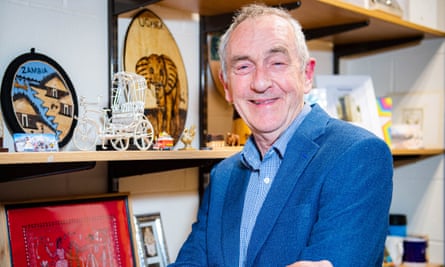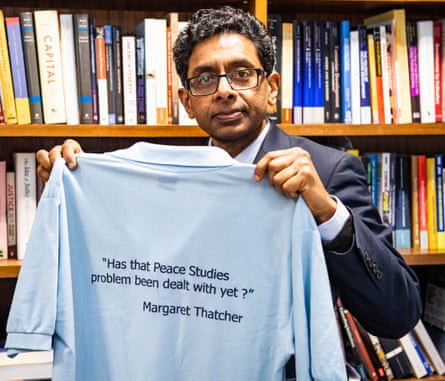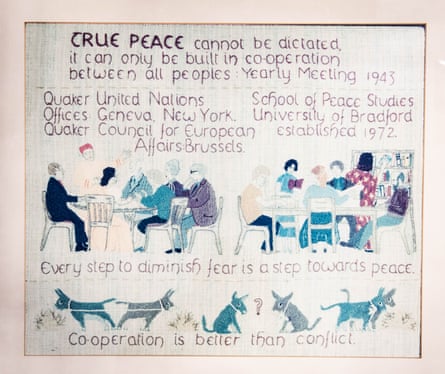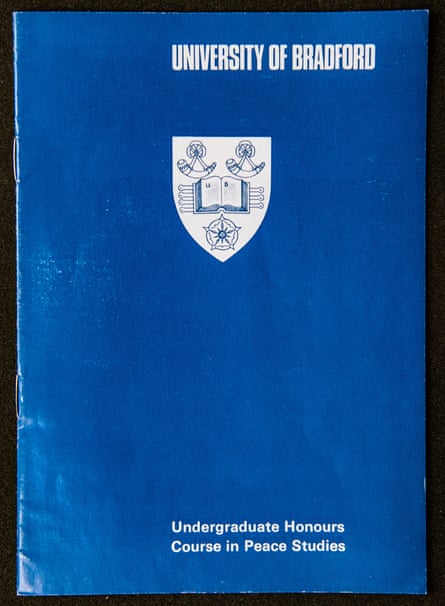‘They thought we were all communists’: Bradford’s peace studies department turns 50 | University of Bradford
There have been a number of memorable Peace v War football matches over the years, with terrific performances from players including the Dalai Lama, Mahatma Gandhi and the eminent Prussian military strategist Carl von Clausewitz (or so the names on the back of the players’ jerseys would have you believe).
But the most crushing victory remains the first, the 15-0 hammering by the University of Bradford’s peace studies department over Kings College’s war studies department.
“I think war studies thought peace were softly-softly hippy types … we were underestimated in that first game,” said Tom Woodhouse, emeritus professor and honorary president of Peace FC. “They seemed to have a capable side but they were more physical rugby types than footballers.”
The 15-0 match was in the mid-1990s. It later became an annual fixture, with the war and peace teams competing for the “Tolstoy Cup”.
The fixture has not taken place since the pandemic but Woodhouse would love to see it played this year, the 50th anniversary of the peace studies department.
It is a fun event with a serious side. “Both departments study the same thing, which is war prevention,” said Woodhouse. “They come more from the military side, we come more from peace building.”
With the peace studies department celebrating its 50th anniversary this year, a number of golden anniversary events will be held to honour a department that today is known across the world as one of the leading centres of conflict resolution and international development.

They include an event next month at the Houses of Parliament, a place where, in the 1980s, Conservative politicians regularly questioned whether peace studies was a suitable subject for academic study.
Back then it was seen by some as a front for the Campaign for Nuclear Disarmament or mocked as the “department of appeasement studies”. At one point Margaret Thatcher was said to have asked: “Has that peace studies problem been dealt with yet?”
Ministers were so concerned that they dispatched Sir Peter Swinnerton-Dyer, chair of the University Grants Committee (UGC), to investigate the department.

Sarah Perrigo, a political theorist, was a lecturer in the department during the 1980s and remembers choppy times and the misunderstanding about what the department was.
She said students were attracted to Bradford because it was “a space for dialogue and debate about what could be done”.
“It wasn’t left wing, it was a safe space for critical thinking and I think that’s why I wanted to be there, too. I would have been unhappy in a straight politics department.
“When I first went people thought it must be about God,” said Perrigo, now 82. “And then it was nuclear weapons. It was neither of those things and the idea that we were all communists … it was a load of bullshit really.”
One of her favourite recollections is her colleague Paul Rogers being interviewed on Radio 4 about nuclear proliferation and, when he finished, the presenters were still on the phone line, unawares. “I don’t know who they were but one said: ‘He sounds like quite a nice man for a communist.’”

The department was given a clean bill of health by the UGC. Rogers, who joined the department in 1979 and headed it in the 1990s, said the increased scrutiny was probably a good thing.
It attracted top students and meant “that you had to do high-quality work because everything would be looked at by people who took a rather different view of things”.
Rogers said students were lively with lots of different and strongly held views. “It was a very exciting place,” he said.
“Looking back on it, it’s always been a rollercoaster. You have academics and students who feel very strongly about what they’re doing and may not always agree. That’s inevitable and healthy, but it makes the management quite tricky at times.
“It was like riding a tiger, you learned a heck of a lot in the process.”

The department itself was founded by Quakers who approached a number of universities about having a school of peace studies. Bradford said yes.
A public fundraising appeal was launched in 1971 and within 10 weeks they had £75,000, including donations from composer and pianist Benjamin Britten, violinist Yehudi Menuhin and Bradford-born novelist and playwright JB Priestley.
Adam Curle, an eminent peace academic, became the centre’s first chair. His colleagues at Harvard were reportedly astonished that he was willing to swap Harvard for Bradford.
In Curle’s inaugural speech he said that he and his colleagues had come together not for “primarily intellectual” reasons, but because they “cannot resist the obligations imposed upon us by our experiences in this darkening world”.
Many students came because they wanted to change the world. Many of them did. Its alumni includes Saeb Erekat, the Palestinian negotiator and politician who died in 2020.

Prof Prathivadi Anand, the current head of department, said the centre had been a success against all odds, and would continue to be so.
“Peace is a quest,” he said. “The human condition and all the challenges we have, such as climate change and food insecurity, are going to need action for the next 20, 30, 40 years. These are not short-term, fashionable issues.
“The nature of programmes and research will change in a dynamic world, but issues like peace and resolution date back to Aristotle and Plato, and we’re still talking about them today.
“I have no doubt our department will still be carrying out vital research and educating the leaders of tomorrow in another 50 years.”

